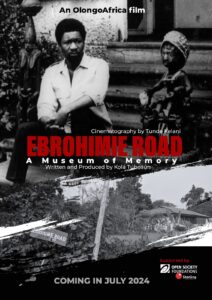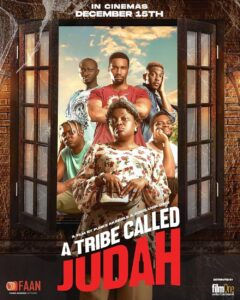Before the premiere of Jagun Jagun, the film’s star and co-producer Femi Adebayo said that he had to first produce his previous action film, King of Thieves (Agesinkole), to “test run the market.” He already had the idea for Jagun Jagun but wanted to be sure how a Yoruba-language historical fantasy epic could be received. King of Thieves was a success. And now, Jagun Jagun, a better-produced tale of the clash of two warriors, is an even bigger triumph.
The first time we meet Gbotija (Lateef Adedimeji), he is a simple man, striding in the forest with a bag slung across his shoulders and a machete in his hand. A baobab tree falls, blocking his path. From the eeriness, we know it is a bad omen. A clear hint at what lies ahead. Communing with spirits, he confronts the tree, calling it “great mother.” The tree obeys his command to “rise up!” A voiceover fills in details: Gbotija is “the son of Lagbayi. . . the one who wakes and talks to the forest trees. . . and now, he’s headed to the Academy of Warriors to learn how to fight.” The academy belongs to Ogundiji (Femi Adebayo), a brutal warrior feared throughout the land, even by kings, who he intervenes to keep or remove from their thrones. With his gait and mannerisms, Ogundiji is a charismatic and terrifying presence.
Adebayo Tijani and Tope Adebayo’s directing satisfactorily depicts the ambitious scale of the story. From electrifying war scenes to fully formed characters, this story moves with energy. It is an enthralling portrayal of ancient wartime Yorubaland, on an epic scale scarcely shown in Nollywood. It is a depiction of power dynamics and class warfare, of how the rich and powerful continually exploit the poor and weak. It is also a familiar classic hero vs. classic villain narrative, but screenwriter Tijani sidesteps clichés. He infuses the story with tension and unpredictability.
The Academy of Warriors is a place of rigidity. After Gbotija complains about food for the warriors and is punished by Ogundiji’s daughter Iroyinogunkitan (Bukunmi Oluwashina), the two fall into a passionate romance. Iroyinogunkitan is attracted to his fearlessness. But it is his exceptional archery skills that draw her father Ogundiji’s attention and jealousy. In the history of the Ori festival, only Ogundiji had ever successfully shot an arrow through disarrayed rings. But Gbotija, the new student warrior, does so with a single aim, courtesy of his ability to communicate with wood. “You must tame the Iroko tree before it grows too tall,” an adviser tells Ogundiji.
Ogundiji decides that in order for Gbotija to get a promotion, he has to undergo three tests. For the first, he must duel with Gbogunmi (Ibrahim Yekini), the second greatest warrior behind Ogundiji, a man Gbotija has learned to call father. Considering Gbogunmi’s skills and social status, it seems a suicide mission for Gbotija, but the spirits come to aid and he slays his foster father.
For the second test, Gbotija has to survive seven days in a coffin without food or water. He does. It is at the completion of the third test — in which Gbotija, with only three warriors, has to wage war against the people of Alaje during their festival of wealth — that Ogundiji maliciously introduces a fourth. No one escapes the burning fire of Agemo, the masked spirit created by Ogundiji for battles that surpass his own warriors’ strength. It is a spirit so powerful that we see it slaughter an army. There is no salvation for Gbotija. Only his power to meld into trees. The woods save him and kill Agemo, and only then do we discover who the spirit really is and the true extent of Ogundiji’s cruelties.
Jagun Jagun works because of the cast. Lateef Adedimeji gives Gbotija a resonance. Femi Adebayo is impressive, even if his Ogundiji is merely a variation of his Agesinkole from King of Thieves. He is able to portray the fierceness of Ogundiji in each frame. Yekini’s solid, conscious Gbogunmi is a foil for both men. (The trio earned honourable mentions in Open Country Mag‘s “The 10 Best Acting Performances of the Year.”) Bukunmi Oluwashina makes Iroyinogunkitan a believable lover to Gbotija. As Ogundiji’s wife Erinfunto, Fathia Balogun has memorable scenes: an altercation with vengeful spirits when Gbotija comes to her rescue, and an argument with Gbotija during the climax.
Costume designers Oluwatoyin Abidemi and Lola Awe recreate ancient Yoruba dressing with flourish. The special effects by Hakeem Onilogbo surpass anything we have seen from Nollywood so far, especially in its details: the mesmerizing sparks of sorcery and the haunting presence of Agemo, for example. The score by Tolu Obanro is a powerful accompaniment that intensifies the drama and makes for an affecting experience. It harmonizes with Adeoluwa Owu’s cinematography, with beautiful shots and angles. Under the direction of Tope Adebayo and Adebayo Tijani, these effects blend effortlessly, creating a world where magic and myth coagulate, and a story that elevates the Nigerian epic. ♦
Edited by Otosirieze.
If you love what you just read, please consider making a PayPal donation to enable us to publish more like it.
More Film & TV Reviews from Open Country Mag
— The Real Housewives of Lagos, Recapped & Reviewed: Glamour & Drama in Las Gidi
— Battle on Buka Street, Reviewed: Blockbuster Dramedy with Emotional Burn
— The Trade, Reviewed: Kidnappers Vs. Police
— King of Thieves (Agesinkole), Reviewed: A Captivating Yoruba Epic
— Gangs of Lagos, Reviewed: A Crime Thriller with Big Ambition
— Brotherhood, Reviewed: A Policeman and a Robber
— Shanty Town, Reviewed: Crime and Punishment, Fate and Freedom
— A Sunday Affair, Reviewed: A Stumbling Story of Romance and Tested Friendship
— Prophetess, Reviewed: A Modernist Portrayal of Faith
— Blood Sisters, Reviewed: A Rousing Murder Thriller
— La Femme Anjola, Reviewed: An African Neo-Noir Titillates in Crime and Lust
— Swallow, Reviewed: Perturbance in Ordinary Lives
— Ife, Reviewed: Lesbian Love in Bourgie Lagos
— Nne, Reviewed: Two Mothers and a Son
— The Men’s Club, Reviewed: A Charming Depiction of Male Friendship





